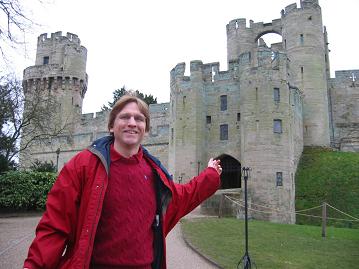|
Note: The statement below was written a decade ago. For an update on Dr. Bonk’s teaching philosophy, you can also read Curt Bonk’s 14 “Last Principles of Instruction,” TravelinEdMan blog post on May 16, 2011. | |
| I left the business world in the mid 1980s, where I had been a CPA and corporate controller, for an educational psychology graduate program at the University of Wisconsin. Like my business colleagues who wanted flexible and creative employees who could look beyond the numbers in an information- based economy, I became interested in whether education or psychology could inform the development of higher-order thinking skills and teamwork. What I found was that students were not being prepared for the global marketplace. Instead, most curricula emphasized the memorization of facts and the acquisition of relatively isolated sub-skills, taught out of context and didactically. Most teachers I observed stressed individual learning over cooperative learning, even though human learning is largely a social enterprise and most human labor is performed by teams. My research, teaching, and service efforts at two major universities over the past decade have been in response to these interests and discoveries. |

|
As a result of my concern for building thinking and collaboration skills, a learner-centered philosophy guides all my teaching and research activities. I believe that if instructors "assist" in learning, instead of simply assessing it, human learning will be significantly enhanced. With these student learning ideals, I am driven to find the most powerful learning formats and environments. Consequently, I experiment with ideas related to constructivism, cooperative learning, and computer conferencing in all my classes. I am constantly using my research findings to tinker with my instructional practices, while concurrently reflecting on how my classroom practices can inform my research. My research on Web-based instruction, electronic collaboration and conferencing, computer support for writing, essay and summary writing, cooperative reading strategies, learner-centered instruction, and social interaction and dialogue all have significant implications for teaching and learning in higher education. My research involves dozens of graduate students at Indiana University as well as many international colleagues. The majority of these research efforts have been published in educational technology related journals and books.
In many ways, my life revolves around the students I teach. My courses come in many formats (i.e., lecture, seminar, workshop, lab), while addressing the gamut of college student levels including undergraduate preservice teachers, practitioners in the field, instructional designers and corporate trainers, and fulltime master's and doctoral level students. With technology-rich classrooms to assist in learning here at Indiana University (IU), teaching is both fun and challenging. Using these resources, I continue to create and refine courses that push both students and myself to the edge of our competencies. When I am not teaching, I am often involved in developing or revamping a course, experimenting with educational technology, coordinating a graduate program, involving graduate students in my research, supervising undergraduate instructors, mentoring visiting scholars, or designing a new Web site.
As a learning environment theorist, I believe that experts, technology tools, peers, teachers, curriculum, self-reflection, and assessment all impact learning. Effective use of these resources can result in active student learning. In using my student-centered teaching philosophy, I try to include some active learning and student choice within every lecture or lab activity. A visitor to any of my classes would note that I use various combinations of tasks such as concept mapping, timelines, taxonomies, summary writing, jeopardy quizzes, fireside chats, Web searching, scavenger hunts, group activities, portfolios, conference-style presentations, scholarly journal creations, etc. As a result of my continued attempts to marry these pedagogical strategies to videoconferencing and Web-based education courses, I have been invited to present my ideas in numerous national and international talks and presentations. The audiences have included higher education faculty and presidents, doctoral students, practicing teachers, and corporate trainers.
In summary, as a learner-centered psychologist and educational technologist, I view teaching and learning at the undergraduate, master's, and doctoral levels as my life mission. From study skill courses to learning centers to research centers on learning and technology, I am dedicated to finding resources and monies that improve college student learning. In my teaching efforts, I have utilized a myriad of distance education and computer conferencing tools, supervised Associate Instructors, mentored dozens of graduate students into research, assisted in teacher education reform at two different universities, developed entirely new courses and programs, organized colloquia related to teaching, and invented a range of pedagogical strategies. My research and publications efforts, furthermore, include journal articles on unique applications of videoconferencing technology, book chapters on learning tools and web-based instruction, articles on adult learning and education, research on online case-based reasoning, manuscripts on improving college teaching, and books on electronic collaboration and learning with technology. With all these activities, I am building a research and teaching reputation that is starting to spread throughout the State of Indiana via distance education as well as to other universities and countries.
Across my teaching, research, and service activities, I have attempted to inspire students, college instructors, practicing teachers, trainers, and administrators by promoting innovative practices with emerging educational technologies. I am deeply committed to expanding access to education through nontraditional means such as Web-based instruction, computer conferencing, videoconferencing, and courses and workshops taught directly in schools and workplaces. I feel fortunate that some of my pedagogical experimentations with technology now serve as models for teachers both in Indiana and around the globe. I often advise my graduate students to try to "make a dent" when they leave IU. I have tried to do the same back here at IU and beyond.